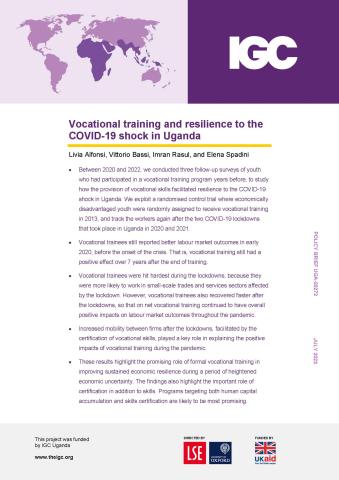Vocational training and resilience to the COVID-19 shock in Uganda
This policy brief explores vocational training and youth resilience during COVID-19 in Uganda.
-
Alfonsi et al Policy brief July 2023
PDF document • 197.88 KB
- Between 2020 and 2022, we conducted three follow-up surveys of youth who had participated in a vocational training program years before, to study how the provision of vocational skills facilitated resilience to the COVID-19 shock in Uganda. We exploit a randomised control trial where economically disadvantaged youth were randomly assigned to receive vocational training in 2013, and track the workers again after the two COVID-19 lockdowns that took place in Uganda in 2020 and 2021.
- Vocational trainees still reported better labour market outcomes in early 2020, before the onset of the crisis. That is, vocational training still had a positive effect over 7 years after the end of training.
- Vocational trainees were hit hardest during the lockdowns, because they were more likely to work in small-scale trades and services sectors affected by the lockdown. However, vocational trainees also recovered faster after the lockdowns, so that on net vocational training continued to have overall positive impacts on labour market outcomes throughout the pandemic.
- Increased mobility between firms after the lockdowns, facilitated by the certification of vocational skills, played a key role in explaining the positive impacts of vocational training during the pandemic.
- These results highlight the promising role of formal vocational training in improving sustained economic resilience during a period of heightened economic uncertainty. The findings also highlight the important role of certification in addition to skills. Programs targeting both human capital accumulation and skills certification are likely to be most promising.





